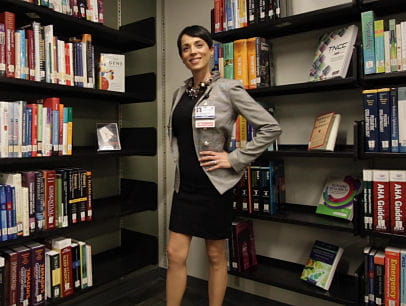Anne Marie Morse, DO, pediatric neurologist and sleep medicine specialist
About Dr. Morse
Dr. Morse earned her Doctor of Osteopathic Medicine from Rowan University. She completed her residency and her child neurology fellowship at the State University of New York, Downstate Medical Center. She then completed another fellowship in sleep medicine at the Albert Einstein College of Medicine of Yeshiva University, Montefiore Medical Center. She enjoys working in her many different roles at Geisinger, which include: clinician, researcher, educator and administrator, and working to develop the child neurology and sleep medicine programs.Two fun facts about Dr. Morse:
Her patients often recognize her by her shoes – she says it’s not uncommon to be referred to as “the doctor in the high heels.”
When she was growing up, she aspired to be a butterfly, because they make people smile.
We asked Dr. Morse a few questions about her career journey, obstacles she’s faced and what International Women’s Day means to her. Here’s what she said:
Why did you decide to pursue a career in healthcare?
I became a physician because of my mother. When I was 5 years old, my mother had her first clinical flare of multiple sclerosis (MS) after she had my little brother. She was wheelchair bound. I don’t recall a lot from then, I was too young to remember. But, I recollect the constant denial my mother lived in about her diagnosis, so much so that she would refuse to acknowledge it as part of her medical history. Frequently stating, “they told me then it was my hormones, if the steroids help, great. If not, this is what you have to live with.” My mother has an exceptionally strong will and refused to let MS keep her in a wheelchair. She would say, “I have four kids, and I am a wife. I don’t have time to be sick, don’t have time to be in a wheelchair and don’t want anyone’s pity.” She refused to see a neurologist for over 20 years.
Witnessing my mother’s difficulties over the years and her refusal to seek care because she felt dismissed with a hopeless diagnosis drove me to want to change that path for other people. I wanted to make sure I could share the road with other’s who experienced the same arduous path my mother had decided/forced to take alone.
Tell us about a challenge you’ve faced along your journey.
The biggest challenge has been learning how to balance the perception of being aggressive with the intention of being an advocate. I guess you can say it’s learning to tame my passion. I see every patient I take care of as a family member, and every parent who is concerned about the child I am caring about, I reflect on as if it is me or my husband thinking about if it were my own little girl. Therefore, when I take my role as the care provider I want to make sure I give my best and will fight for that.
What I have learned is to be confident in what I know and who I am. Don’t be afraid of being wrong. Embrace mistakes as a learning opportunity. Don’t forget the people you care for are human, not diagnoses or medication regimens. It’s all about teamwork – don’t advocate alone, ensure the care team and family are all in line with the same goals.
What advice would you give to other women looking to get into the healthcare field?
Becoming a physician has been the best decision I have ever made. It is not uncommon for there to be warnings about the long road ahead and the emotional difficulties that will come. Frequently, forcing you to question, “will I be able to handle this, am I strong enough, will I have time to have a family of my own?” The answer will be individualized. However, I would say YES, entering the healthcare field has challenges, BUT the rewards are overwhelming. Hopefully, you will share the experience I have had where frequently I am reminded by families and patients who thank me for my time, praise me for the strength and family who support me in taking care of others. My husband, who encourages me to be the role model he wants my daughter to look up to, and even my 2-year-old daughter reminds me, “mama… good… sick babies.” I think the translation is her telling me I am doing a good job taking care of sick babies.
The theme for this year’s International Women’s day is “Balance for Better,” focused on building a gender-balanced world. What does that mean to you? How can we make a positive difference for women everywhere?
Balance for Better… Encourage women to define who they are and what their strengths are, and to relinquish the fear of judgment and failure. Irrespective of gender promoting each other based on character and accomplishment, while being mindful that we each carry an unconscious bias, which sometimes may even be a woman’s own bias against another woman.

